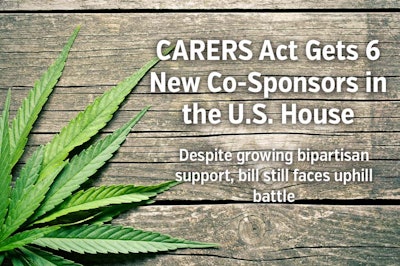
Updated 10/5/2015, 3:15 p.m.
Six new co-sponsors—three democrats and three Republicans—have signed on to the CARERS Act of 2015 (H.R. 1538), also called the Compassionate Access, Research Expansion and Respect States Act.
The representatives to sign on in support of the bill are:
- Rep. Peter DeFazio (D-Ore.)
- Rep. Chris Van Hollen (D-Md.)
- Rep. Marshall “Mark” Sanford (R-S.C.)
- Rep. Mike Coffman (R-Colo.)
- Rep. Theodore Deutch (D-Fla.)
- Rep. Mick Mulvaney (R-S.C.)
The bill's full title explains that its purpose is "To extend the principle of federalism to State drug policy, provide access to medical marijuana, and enable research into the medicinal properties of marijuana."
The bill, which was introduced in the House in March by Rep. Steve Cohen (D-Tenn.) and Rep. Don Young (R-Alaska), now has 22 cosponsors (11 Democrats, 11 Republicans). It was referred to a Congressional committee March 23.
The bipartisan legislation would allow states to set their own medical marijuana policies. While it would not legalize medical marijuana in any state, it would recognize a legitimate use for marijuana at the federal level (moving marijuana from Schedule I to Schedule II of the controlled substance act) and allow Veterans Affairs (VA) doctors to recommend safe and effective marijuana-related treatments. The bill also would exclude cannabidiol from the definition of marijuana, would enable research into the medicinal properties of marijuana, and would allow access to banking services for marijuana-related businesses that are operating pursuant to state law.
H.R. 1538 is a companion bill to S.683, also called the CARERS Act, which was introduced in the Senate in March by Senators Corey Booker (D-NJ), Rand Paul (R-KY) and Kirsten Gillibrand (D-NY). S.683, which now has 15 co-sponsors (including two Republicans), has been referred to the Committee on the Judiciary.
The CARERS Act is the most comprehensive medical marijuana bill ever introduced in Congress.
Despite the number of co-sponsors signing on in support of the H.R. 1538, the prognosis is that the bill has a 1 percent chance of being enacted.
 Dan Riffle, Marijuana Policy Project
Dan Riffle, Marijuana Policy ProjectDan Riffle, Marijuana Policy Project
"I think the reason for the low prognosis is that the bill has to go through the House and Senate Judiciary Committees, and the chairmen of each—Bob Goodlatte (R-Virginia) in the House, Chuck Grassley (R-Iowa) in the Senate—are staunch supporters of the war on drugs," says Dan Riffle, Director of Federal Policies for marijuana law reform organization Marijuana Policy Project. "Both have been in Congress for decades and helped pass mandatory minimum sentencing bills and other punitive policies that contributed to the current mass incarceration problem. For them to acknowledge that arresting and prosecuting marijuana users hasn’t reduced marijuana use rates would be to admit they were wrong, which they’re unwilling to do," he adds.
"It’s unfortunate really. I’m a former prosecutor, and I’ve been encouraged to see so many people in the criminal justice system speak out to say that this is a public health issue, not a criminal justice issue, especially when it comes to medical issues like marijuana for treatment of pain or cancer treatment symptoms as recommended by physicians. Grassley and Goodlatte either haven’t heard or refuse to listen to the message," Riffle notes. "We’re quite confident we have majority support for the CARERS Act in both the House and the Senate, but Grassley and Goodlatte have so far refused to hold hearings on it despite broad bi-partisan backing."
Taylor West, deputy director for the National Cannabis Industry Association (NCIA) says, "I think the biggest factor in any bill’s relatively low likelihood of passage is the relatively low likelihood that Congress passes any bill at all."
She does, however, think it's "a genuinely good sign of progress that the CARERS Act continues to gain co-sponsors in both parties."
The next step, she adds, "is pushing for the bill to get a hearing in the committee it’s been assigned to. The odds for that will increase as we’re able to attract co-sponsors who serve on that committee and put pressure on the committee chair to act. But it is definitely a slow process, especially when dealing with a committee chair who is not personally friendly to the cause."
Despite what may be an uphill battle for the bill, West remains optimistic about the legislative progress that has been made so far in the fight to end prohibition. "Make no mistake, there’s been more progress on marijuana-related legislation in Congress in the last two years than we’ve seen in decades, but there’s still a hard road ahead of us," she says. "As more states open up to medical and retail cannabis, it’s absolutely imperative that people in the industry commit to the political advocacy efforts NCIA and others are making on the Hill."

























